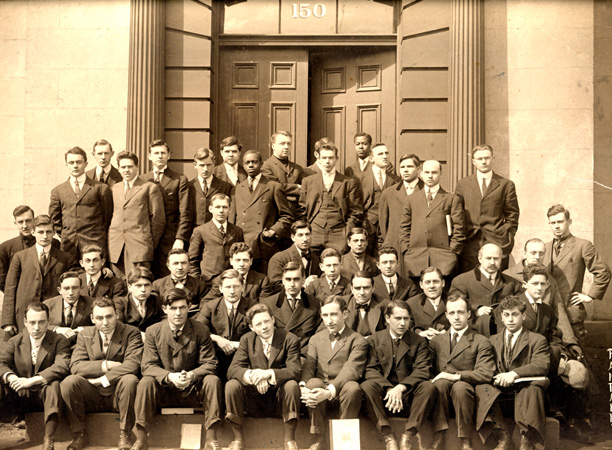 Are the accusations of sexism in the dictionary definitions that have moved through social media last week reasonable? While problems in the entries seem clear, the situation is complicated. In case you missed it, Michael Oman-Reagan, a PhD candidate in Canada noted that the Oxford Dictionary presented “rabid feminist” as an example for the entry “rabid,” which he included as one among many examples of “explicitly sexist” entries. The dictionary editors responded that their “example sentences come from real-world use,” but, of course, they chose which everyday example they wanted to enshrine. For a term with a negative connotation like “rabid,” such a choice provides an opportunity to offend someone, making the choice significant. If they had written “rabid NRA member” or “rabid leftist,” different groups might be complaining. Continue reading “A Rabid Dictionary?”
Are the accusations of sexism in the dictionary definitions that have moved through social media last week reasonable? While problems in the entries seem clear, the situation is complicated. In case you missed it, Michael Oman-Reagan, a PhD candidate in Canada noted that the Oxford Dictionary presented “rabid feminist” as an example for the entry “rabid,” which he included as one among many examples of “explicitly sexist” entries. The dictionary editors responded that their “example sentences come from real-world use,” but, of course, they chose which everyday example they wanted to enshrine. For a term with a negative connotation like “rabid,” such a choice provides an opportunity to offend someone, making the choice significant. If they had written “rabid NRA member” or “rabid leftist,” different groups might be complaining. Continue reading “A Rabid Dictionary?”
The Golden Age

As a college professor I often hear faculty lament the students we have “these days”; there’s a nostalgic decline-and-fall narrative we tell, according to which we’re far removed from the golden age when students were prepared for college and could actually read and write upon arrival. If only we could return to the seventeenth century, when students came to college reading Latin and knowing their Seneca and Cicero!
However, when this narrative is shared (and, to be honest, I’ve told the tale myself), what I hear — what that narrative seems to implicitly suggest — is this: things were better back in the old days, before they let a lot of women and blacks and kids from the working class into college. Continue reading “The Golden Age”
The Individual as Product and Producer

Every research investigation in the social sciences or history is involved in relating action to structure, in tracing, explicitly or otherwise, the conjunction or disjunctions of intended and unintended consequences of activity and how these affect the fate of individuals…. For the permutations of influences are endless, and there is no sense in which structure ‘determines’ action or vice versa. The nature of the constrains to which individuals are subject, the uses to which they put the capacities they have and the forms of knowledgability they display are all themselves manifestly historically variable. (p. 219)
Giddens makes an important point here, one frequently overlooked by scholars who emphasize either agency or structure in their work, and thereby failing to understand the two as heads and tails of the same situated, historical complex. Continue reading “The Individual as Product and Producer”
PC Power
 Books can be the best Christmas gifts, at least in my humble opinion. I have already finished one novel that I received for Christmas, Singapore Exile Murders by F. van Wyck Mason. Written, published, and set in 1939, the novel incorporates the responses of Europeans and Americans in southeast Asia to the global events leading up to World War II, making it an intriguing historical artifact based on one person’s imaginings. As a piece of data, the language in the novel surprised me at points, including the off-hand use of terms for African-Americans and Chinese that would be considered offensive today.
Books can be the best Christmas gifts, at least in my humble opinion. I have already finished one novel that I received for Christmas, Singapore Exile Murders by F. van Wyck Mason. Written, published, and set in 1939, the novel incorporates the responses of Europeans and Americans in southeast Asia to the global events leading up to World War II, making it an intriguing historical artifact based on one person’s imaginings. As a piece of data, the language in the novel surprised me at points, including the off-hand use of terms for African-Americans and Chinese that would be considered offensive today.
Beyond illustrating how what is considered acceptable has shifted in the past 75 years, these problematic terms (by our standards) also illustrate the ways everyday language reinforces, even makes appear normal, social hierarchies. The ways that Europeans and European-American characters use these terms in casual speech places African-Americans (who do not appear as characters in the novel) in the position of menial, hard laborers and Chinese (who are primarily servants, rickshaw pullers, and the like) as clearly inferior. The condescending labels thus socialize people into particular positions of inferiority and superiority by making the hierarchy appear natural, simply the way things are. Continue reading “PC Power”
Global Grover, Meet Edward Said

Being the parent of a toddler has introduced me to all sorts of things I’d never have known about otherwise: how many Legos can be stacked before a tower topples, the sound of a stuffed rabbit singing when I accidentally step on it at 2a.m. (yes, I’ve done it more than once, and yes, it’s just as terrifying as you’d expect), the exact amount of time a paper airplane proves entertaining until it just decidedly doesn’t, the glee inspired by dogs and cats yowling “Jingle Bells,” and…most recently, Global Grover.
I don’t have cable, and I’m just fine leaving well enough alone when it comes to the shows my kid doesn’t know he’s missing until such a time as they become unavoidable. But my own generation was raised on TV, and I don’t have an ultra cynical take on it… and I do remember fondly the old standbys, namely Mr. Rogers’ Neighborhood and Sesame Street. So I just shrug when, despite best efforts, certain things just slip into my child’s consciousness. He’s only just two, and he already sings the melody and words from the Elmo’s World theme song, for crying out loud. Resistance is futile. Continue reading “Global Grover, Meet Edward Said”
On the Market, Playing the Game: On Status and Elitism in Academia
 While sitting in the lobby of one of the conference hotels during our discipline’s major conference in November, I was joined by a group of post-docs and very early career scholars who were (loudly) discussing their career plans in this tight market. What I caught of their conversation can be summed up as such: We all currently have (or hope to have) tenure track jobs at “teaching schools,” but as soon as we can, we’ll get out of there and move on to the “real” jobs at elite institutions where our research will be valued.
While sitting in the lobby of one of the conference hotels during our discipline’s major conference in November, I was joined by a group of post-docs and very early career scholars who were (loudly) discussing their career plans in this tight market. What I caught of their conversation can be summed up as such: We all currently have (or hope to have) tenure track jobs at “teaching schools,” but as soon as we can, we’ll get out of there and move on to the “real” jobs at elite institutions where our research will be valued.
This is a popular sentiment, albeit fantasy for most (in light of the current market). Yet I think it deserves attention, for I believe it to be responsible for some very subtle sorts of power plays that many of us may not recognize as such. For those of you not familiar with the lingo, a “teaching school” is a college or university where greater emphasis is placed on one’s teaching competencies and comparatively less on one’s research, which means that faculty at such schools tend to have larger teaching loads and, typically, less paid time to produce scholarship. The opposite is the case at more elite institutions, where (on the whole) faculty have opportunities to teach less, specifically to give them time to produce the aforementioned research. Continue reading “On the Market, Playing the Game: On Status and Elitism in Academia”
Coz these are the good old days
 I remember my dad, when I was younger, talking to a customer at the gas station that my parents owned and operated. The man was complaining about the price of gas going up and up and waxing nostalgic for how much it was years ago.
I remember my dad, when I was younger, talking to a customer at the gas station that my parents owned and operated. The man was complaining about the price of gas going up and up and waxing nostalgic for how much it was years ago.
Now, my dad, who was born in 1923, also remembered things about the past but his memories ran counter to his customer’s; so I recall him replying with how much a quart of milk used to cost (yes, my dad once was a milkman, going door-to-door with a horse and wagon), pointing out that no one today seemed to complain about its astronomic rise in price — for if we use the early 1930s as our benchmark, when he was a kid, then the cost of milk has increased somewhere around 800% since then. Continue reading “Coz these are the good old days”
New Schedule for Posts from Culture on the Edge

With a new year comes a new schedule for original content from the Edge.
So beginning the week of January 11 we’ll start posting new content
every Tuesday and Thursday (hitting the web at 2 am Central time, so that our friends in Europe have something to read while we’re sleeping).
And then, come the weekend, we’ll post some things from the archive
that you may have missed the first time around.
Live those dreams, scheme those schemes

We hope that you made it through last night’s celebrations relatively unscathed.
And that you started off 2016 by sleeping in….
But now it’s time to wake up!
